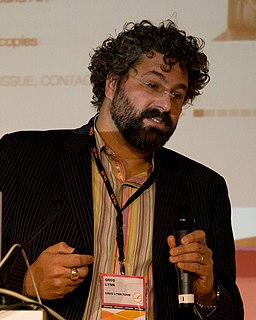A Quote by Hayao Miyazaki
Do everything by hand, even when using the computer.
Quote Topics
Related Quotes
I have been using the computer as a work aid since the mid-90's. It is extraordinarily well suited to how I think and work and has transformed my practice. Nearly everything I have done in the past 15 years would have been impossible without it. I use the computer for drawing, composing and colour planning everything, from postage stamps to paintings to architectural-scale installations.
Artificial intelligence uses a complex set of rules - algorithms - to get to a conclusion. A computer has to calculate its way through all those rules, and that takes a lot of processing. So AI works best when a small computer is using it on a small problem - your car's anti-lock brakes are based on AI. Or you need to use a giant computer on a big problem - like IBM using a room-size machine to compete against humans on Jeopardy in 2011.
Artificial intelligence is based on the assumption that the mind can be described as some kind of formal system manipulating symbols that stand for things in the world. Thus it doesn't matter what the brain is made of, or what it uses for tokens in the great game of thinking. Using an equivalent set of tokens and rules, we can do thinking with a digital computer, just as we can play chess using cups, salt and pepper shakers, knives, forks, and spoons. Using the right software, one system (the mind) can be mapped onto the other (the computer).
Basically, you're still sitting there using just the muscles of your hand, really. Of one hand, actually. It's another example of the transfer of literacy to making music because the assumption is that everything important is happening in your head; the muscles are there simply to serve the head. But that isn't how traditional players work at all; musicians know that their muscles have a lot of stuff going on as well. They're using their whole body to make music, in fact.
When I use a direct manipulation system whether for text editing, drawing pictures, or creating and playing games I do think of myself not as using a computer but as doing the particular task. The computer is, in effect, invisible. The point cannot be overstressed: make the computer system invisible.
Good checklists, on the other hand are precise. They are efficient, to the point, and easy to use even in the most difficult situations. They do not try to spell out everything--a checklist cannot fly a plane. Instead, they provide reminders of only the most critical and important steps--the ones that even the highly skilled professional using them could miss. Good checklists are, above all, practical.
We're in an inflection point where it's cheaper to learn to read on a tablet computer than it is to learn to read on paper. And that being the case, it's only a matter of time before every 6-year-old kid has a tablet computer, and we know for a fact, 3- to 4-year-old kids are using tablets and iPads, and 75 and 80 year olds are using them.
I've never been much of a computer guy at least in terms of playing with computers. Actually until I was about 11 I didn't use a computer for preparing for games at all. I was playing a bit online, was using the chess club mainly. Now, obviously, the computer is an important tool for me preparing for my games.
I was asking questions which nobody else had asked before, because nobody else had actually looked at certain structures. Therefore, as I will tell, the advent of the computer, not as a computer but as a drawing machine, was for me a major event in my life. That's why I was motivated to participate in the birth of computer graphics, because for me computer graphics was a way of extending my hand, extending it and being able to draw things which my hand by itself, and the hands of nobody else before, would not have been able to represent.






































